- Home
- Hermann Hesse
Soul of the Age Page 14
Soul of the Age Read online
Page 14
It’s a pity my news isn’t more cheerful. But at least it’s not all that terrible, and nowadays that’s saying something. There is no point mailing things across the border anymore; either most items are forbidden or the appropriate regulations are so cumbersome that there is no point. I’m sending you a couple of marks for Christmas, and hope you will buy yourself something with it.
If Zündel’s life of Blumhardt122 is among Father’s books, I’d like to borrow it. It used to be in Calw, but was hardly Papa’s own.
We’re burning our last bit of coal. If the war is still going strong next winter, we shall all freeze. If worse comes to worst, I shall drop everything and head off to Ticino, where at least they have a mild climate and hardly any frost.
That’s it for now. I have to go to the office to see my staffers, who have been working overtime up to midnight, almost every evening.
TO MAX BUCHERER123
Bern, December 25, 1917
It’s so long since I have been able to spend a decent amount of time in Zurich. When I’m there, I have to meet all kinds of people and don’t manage to have real conversations with my friends. Actually, I’m now leading a quiet, secluded life, and I try to ensure that the bustle going on outside remains as unintrusive as possible. What I mean by “bustle” is not just the war, my official position, the scandalous conditions in politics and government—I never had much time for that sort of thing—but also most acquaintances, “events,” exhibitions, performances, etc. The war exacerbated an inner conflict that has isolated me over the past two years, and although I don’t regret that struggle, I haven’t yet fully come to terms with it.
I spent an evening with some German politicians last week (Haussmann was there) and was not particularly impressed this time either. We can hope at best that the Prussians don’t jeopardize the likely peace treaty with Russia124 by coming up with exceedingly cheeky demands, which they could easily do. I have nothing against the people themselves, and have met splendid individual Prussians. Moreover, I don’t believe that those who hold power in England or America are any better. However, the principle underlying the form of our government and way of life is more clearly articulated in Prussia than anywhere else. And I have increasingly come to regard that principle as my polar opposite and archenemy, something I need to fight with my entire being. And that’s a feeling shared by those supporters of entente who talk about Prussian militarism. A man came to see me today who used to move in the highest circles of German officialdom; he had a top position at Krupp’s, and worked for some time with Jagow and the Foreign Office.125 He was still there during the first year of the war, and was entrusted with important missions in then neutral Romania. He left Germany a year ago, because he couldn’t tolerate the prevailing mentality, and cut off all ties. I see signs like this all around me, almost daily.
I have been absolutely overwhelmed, my office workers have been working overtime for the past three weeks up to midnight almost, but nonetheless our Christmas packages for the prisoners will be late once again. I placed some large orders at the end of August, but they haven’t even arrived yet. Good books are becoming as scarce as flour made from real wheat. There hasn’t been any Gottfried Keller available for months from any publisher. But there is paper galore for bad propaganda books and pathetic things like that little book by the aviator Richthofen126 (ca. 350,000 copies in print). Even though I’m constantly fighting to preserve these efforts on behalf of the prisoners and ensure they remain uncontaminated by patriotic or political tendencies, I nevertheless feel increasingly that I’m fighting a losing battle for a master whom one ought not serve. I would have given up the whole thing long ago if I didn’t know and love a Germany that doesn’t at all resemble its official incarnation. A certain bashfulness is holding me back, and while I must have some reason for feeling that way, I often think it’s just foolishness or cowardice.
We have a couple of official holidays here, so I don’t have to be in the office today and tomorrow. I’m in the process of setting up a small publishing house. Since most of the books I need are either hard to procure or unavailable, I want to publish some small, easily produced works myself, here in Bern, as long as I can still get paper, so I can send them to the prisoners as gifts.
During the negotiations about prisoner exchanges, which went on here for weeks, France took such an obstructionist attitude that all the fine plans had to be ditched. The ruthless policies being pursued over there as well leave little room for human considerations. Hundreds of thousands of people are cooped up together; they have been imprisoned for three years now (roughly equivalent to the sentence formerly handed down for second-degree murder!) and are not just being treated badly; they’re being systematically destroyed. The other side doesn’t want so many useful people ending up in enemy hands; the idea, after all, is to cripple the enemy! I have no interest in politics, otherwise I would have joined the revolutionaries long ago. I really long to get away from the endless abominations being perpetrated on both sides, get back in touch with myself, and pursue some purely intellectual tasks. At present, my official duties permit me to do so for only a few hours at a time [ … ]
TO SIGMUND FREUD
Bern, September 9, 1918
Dear esteemed Herr Professor,
I was rather embarrassed to receive your letter thanking me,127 since I am really indebted to you. I am delighted to have this opportunity to convey my gratitude to you. Unconsciously, artists have always taken your side, and they will become increasingly conscious of this alliance. Most heartfeltly and cordially
TO HIS SISTER ADELE
Bern, October 28, 1918
Dear Adis,
I’m writing today because there is something you should know about, even though there is not much I can say. I have drifted away from the family over the years and am now very much alone, but I am still keenly aware of the bonds between us.
Nobody knows about some of the things that I had to endure during our fourteen years of marriage. The last few months were the most difficult of all, both for Mia and for me: I had thought for some time that I knew the meaning of suffering, and had emptied the chalice. But it’s not over yet. A great misfortune (not entirely unexpected of late, but so sudden it exceeded our worst fears) has befallen us. Mia, who was in Ticino with Brüdi128 for three weeks, developed a severe psychosis; she was brought to a sanatorium in a confused state, suffering from mood swings. I haven’t seen her since. She is now in Küsnacht near Zurich.
I haven’t figured out yet how to manage the household and children alone. Some friends have been lending a hand. I shall either try to find a housekeeper, and keep things as they are, or (and this seems more likely) find lodgings for the boys, get a maid, and remain here in the house myself.
There’s no need for you to get worried. It’s possible, indeed probable, that Mia will get well again, but there is, of course, no way of knowing how long her recovery would last. She is well taken care of, and at present there is nothing more one can do for her. The children are fine; they know only that Mama is sick and cannot come home. Brüdi will probably stay in Kirchdorf—we had just decided we wanted him to spend the winter at home. I don’t want to describe the actual misfortune, or my attempts to trace the early signs of it, and track down Mia’s missing luggage, etc. We have come through the first bout, and shall continue to prevail. You should only mention this to my closest friends.
My dear little sister, I know that you think of me often, and feel sorry for us, and also remember us in your prayers. I share your belief that this is not in vain. I have been reading Mother’s letters, and am often with you in spirit.
TO CUNO AMIET129
Bern, January 5, 1919
Today I send you my greetings and I also have a request, but expect a reply only if the idea appeals to you.
The war has really hurt me. I have served as a wartime official for over three years (I’m a German subject), and have had to neglect my own work to attend to these other duties
. I still had some income from my books, but that was all in German currency, and you know how much that is worth now. Then along comes the revolution, so I now stand to lose most of my previous savings, which are invested in German State Bonds. But quite apart from that, I’m in a very awkward situation right now, because I cannot get any money at all out of Germany.130
The situation was quite tolerable, and I didn’t worry much about it while my health held out and conditions at home seemed reasonable. But my wife is now suffering from a severe nervous illness. She has been institutionalized for the past few months, and I have had to put the children in lodgings. And my financial predicament has worsened as a result. Some of my friends are helping out, but I have to make sure that I earn something in the near future, of necessity in Switzerland, since my German income is virtually worthless.
Hence the following request: I have copied out a number of manuscripts this year and illustrated them with little sketches. Each of these manuscripts, which contain twelve poems and a title page—thirteen pages, in other words—could be sold for 200 to 250 francs. They would appeal to connoisseurs and collectors of beautiful books, curios, etc.; some have already been sold. I donated the first few copies to a fundraiser for the German POWs, but need to use the rest for myself.
The manuscripts have thirteen mostly colored illustrations, and each is one of a kind: no two have identical contents and drawings.
It would certainly be helpful if you could mention this to friends of yours who buy pictures, etc. Of course, only if you feel like it. Please ignore this letter if you don’t like my naïve, childlike sketches. They’re worthless as art. Whatever value they have has to do with the common origin of the poems and pictures; both were created by the same hand, stem from the same sensibility, and the resulting unity of text and “illustration” is quite unusual.
Enough of that! I hope your New Year has been better than mine. Please keep this to yourself; I don’t want compassion from my friends, and have gradually withdrawn from everything. I don’t feel devastated, have kept up my work, and know for certain that there are better times ahead.[ … ]
PS: I’m enclosing a few pages, and hope you will accept them as a New Year’s greeting from me.
TO FRITZ BRUN
March 9, 1919
I was delighted to get your letter. You’re absolutely right. But there is one thing you’re mistaken about: I don’t feel alienated and isolated just because of the material hardship. It’s true that I cannot count on my savings and don’t have access to most of my income, but even though that is a cause for concern, it isn’t enough to finish me off.
I have been doing a lot of rethinking since the end of the war, and am not yet done. The most pressing issue at the moment is the family situation, but I think that I may have found a provisional solution. You already know that my wife is suffering from a nervous disorder, and that I have been on my own for almost half a year now. I realize now that I have to make certain changes in my life; my marriage is falling apart. I’m trying to find a way to disengage myself from the family and withdraw. That would be easy enough if my wife were in good health, since she has the best will in the world. But I have to make provision for her and the children before I do anything else. I think my wife will first set up a smaller household, and then, if she stays healthy, she can gradually take the children back. I shall look for a hideaway somewhere else, probably in Ticino.
Please don’t tell anybody.
Your kind letter shows that I do have friends—not that there was ever any real doubt, but it’s nice to see some proof. Many thanks!
I see myself sprouting new leaves for a few more summers, and hope to hear them rustling in the wind; it doesn’t matter what age the trunk is. I also intend to keep on playing all sorts of music in my usual fashion, but there are still some clouds obscuring that delightful prospect.
TO EMIL MOLT
Montagnola, June 19, 1919
[ … ] My family is still in the house in Bern. We have given notice for the fall, but it’s almost impossible to find another apartment in Bern. The shabbiest city apartment with only half the present space, and without any garden or anything, would cost more than what we now pay. We’re trying to stay here. If we succeed, my wife will stay put and rent out a few rooms. It would be a terrible pity if they had to leave Bern, since the boys attend local schools, and the cost of moving has escalated.
My plans are uncertain, but I intend to remain ensconced here as long as possible. The length of my stay will depend on how my wife fares. I’m hard at work, writing and painting, but haven’t yet fully recovered, since I’m still coping with the aftereffects of those upheavals. Things are gradually improving.
These last few evil years have made me, and every other serious-minded person, define my personal mission in life and stick to it, regardless of the immediate consequences. My mission has more to do with intellectual matters than with practical or political affairs. I see a relationship between the events taking place in the world now and ideas I had before the war about European intellectual life and the decline of Europe. I still think along those lines. These experiences have certainly deepened the psychological element in my work, but they have also forced me to confront a number of technical challenges. Writing has become a real struggle. But I now have confidence in my goals again, and feel that this is the right path for me.[ … ]
TO LOUIS MOILLIET131
Montagnola, July 24, 1919
Caro amico,
I have bolted the door and the window, there’s a bottle of Chianti on the desk, it’s chilly and disgusting outside. Life is often quite unbearable.
I just finished the piece I’ve been working on just about every evening since I got here. It’s a long novella,132 the best thing I have ever done, a break with my earlier style, and the beginning of something entirely new. The piece is certainly not beautiful or comely, a bit like potassium cyanide, but it’s good and needed to be done. I’m drinking wine and starting a new piece,133 and without the work and the wine, everything would seem intolerable.
You have occasionally seen me when I was sad and ill, since, after all, one cannot always be a figlio d’un ricco Signore.134 By the Lord Zebaoth, I hope this doesn’t scare you away. I assure you, my dear Moilliet, that your presence in this odd world comforts me no end.
We have had some beautiful, enchanting days; at night the moon chased like mad around the heavens; morning soon dawned, and we crawled home with red wine all over our waistcoats. We were in Carona, saw the cannonballs135 again and Generoso136 all violet. Our elegant Ruth137 ran around in a fiery little red dress, accompanied by a splendid menagerie: an aunt, two dogs, and a piano tuner, who was unfortunately insane. The whole affair finished up in a dark grotto, which was suspended somewhere in the air, lit-up trains roared by below, women were kissed, and also some tree trunks. It was painfully beautiful.
Little pleasures like this cheer up our poor hearts and shorten the lengthy trajectory of life. Unfortunately, my eyes have been out of action for the past few weeks and hurt a lot. At times the going is rough, and unfortunately, these days it’s impossible to do any painting outdoors. I often put a blob of geranium lacquer on a sheet of white paper at home, and use it to draw illustrations or something imaginary. In the evenings, when I cannot work or my eyes are troubling me, I can always succumb to the lure of a rustic tavern, where I can sing praise to the Lord and see double versions of my stars on the ceiling.
TO WALTER SCHÄDELIN
August 16, 1919
I was delighted to get your letter this morning. Many thanks! You have a strong faith in God, and your life has a center. In my case, the pressures are centrifugal. But I’m also determined to mature fully; you’re perfectly free to rename the phenomenon that I call the will to self-destruction. Now that I’m alone and more in touch with myself, I’m gradually coming to terms with the loss of everything that has disintegrated over the past few years. I tend to interpret my own experiences, and those of
my people symbolically, viewing them as part of a larger development.
We seem to have misunderstood each other in our letters. You wrote saying that I shouldn’t leave the boys with my wife, since you felt she couldn’t provide any stability. That fear, the thought that my wife could have another breakdown, is the sword that has been hanging over my head since the fall of 1918. So your letter came as a shock, since I know that if I start worrying about that again, I shall be racked with infernal torments for days and nights on end. My own feeling is that I cannot adopt your suggestion to cut off my wife completely, treat her like an invalid, have her confined, and take away the children. That would deal her a mortal blow. Besides, she still means a lot more to the children than I ever could. Nothing is left of family life except the worries; the rest has receded into the past. At the moment, I’m trying to center my life on my intellectual, creative activity or task, whatever one wants to call it, because I have to, if I want to survive. I’m being crushed by fate, and just have to let the wine in me flow. That isn’t always easy. The world has changed and with it my life, and these developments pose intellectual and artistic challenges for me. My previous methods are not equal to that kind of challenge; I now live in a makeshift hut, and each day I have to produce and test some new tools and weapons.

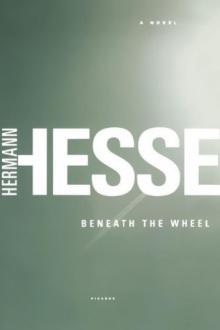 Beneath the Wheel
Beneath the Wheel Strange News From Another Star
Strange News From Another Star Narcissus and Goldmund
Narcissus and Goldmund Steppenwolf
Steppenwolf Siddhartha
Siddhartha Demian
Demian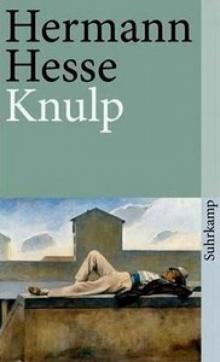 Knulp
Knulp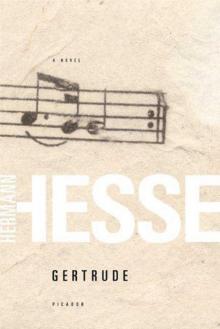 Gertrude
Gertrude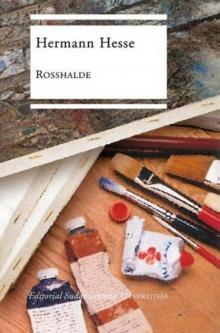 Rosshalde
Rosshalde The Glass Bead Game
The Glass Bead Game The Journey to the East
The Journey to the East Klingsor's Last Summer
Klingsor's Last Summer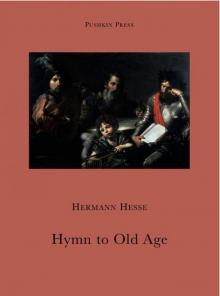 Hymn to Old Age
Hymn to Old Age Poems
Poems The Fairy Tales of Hermann Hesse
The Fairy Tales of Hermann Hesse Singapore Dream and Other Adventures
Singapore Dream and Other Adventures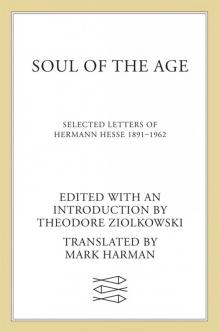 Soul of the Age
Soul of the Age